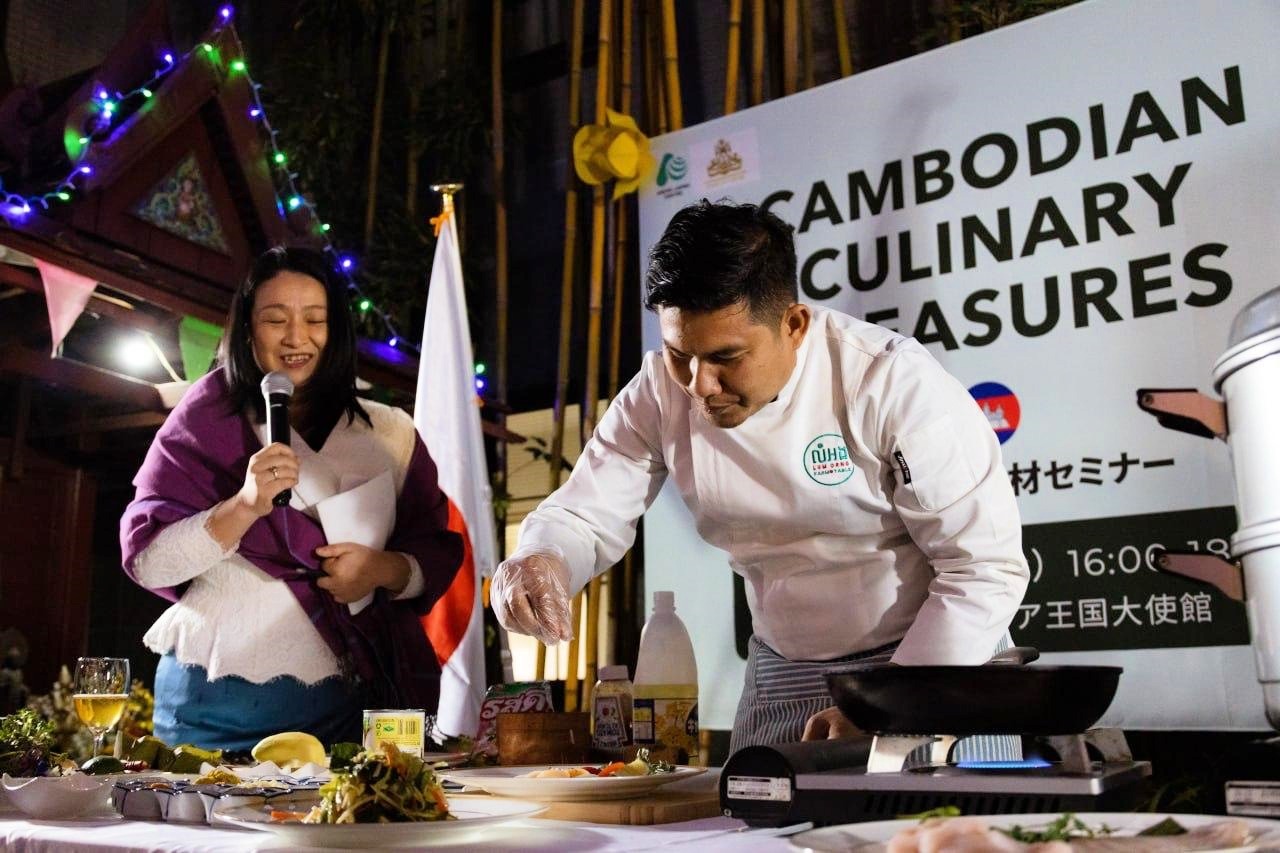Date: 21 February 2025
Venue: Royal Embassy of Cambodia in Japan
Organizers: ASEAN-Japan Centre & Royal Embassy of Cambodia in Japan
Executive Summary
The Cambodia Food Show, co-organized by the ASEAN-Japan Centre and the Royal Embassy of Cambodia in Japan, served as a powerful platform to highlight Cambodia’s rich culinary heritage and emerging agri-food sector. Held on 21 February 2025 in Tokyo, the event gathered over 80 Japanese business representatives, importers, culinary professionals, and other stakeholders.
Combining cultural showcase and trade and tourism promotion, the event featured sectoral presentations, product exhibitions, a Khmer cooking demonstration, and a networking reception. The overarching objective was to strengthen Cambodia-Japan partnerships by showcasing the country’s high-quality food products—such as Kampot pepper, cashew nuts, dried mango, and organic rice—alongside practical business models for trade.
Strategic Insight and Way Forward
The event underscored that market interest alone isn’t enough—creating a reliable supply chain system, fostering local familiarity, and ensuring product readiness are key to unlocking trade opportunities. Japanese companies are increasingly interested in Cambodian goods, especially in the health and organic products, but they expect certified quality, consistent supply, and clear business procedures—and Cambodian producers are showing growing interest in aligning with these expectations.
To move from interest to sustained market entry:
1. Begin with export-ready products, and support them through improved certification, branding, and market adaptation.
2. Focus on health-conscious and organic offerings, which resonate more strongly with Japanese consumers than novelty alone.
These insights point to practical next steps for expanding Cambodia’s presence in the Japanese agri-food market.
Key Takeaways
Market Opportunities
Cambodian agri-food products are gaining interest in Japan, particularly in the health-conscious, organic, and premium food segments. Survey respondents and registrants expressed interest in spices and herbs, fresh fruits and vegetables, and organic goods—categories that align with Japanese consumer trends toward natural, flavorful, and ethically sourced products.
「農業製品のクオリティの高さを認識しました」
→ “I realized the high quality of Cambodia’s agricultural products.”
「積極的に海外からの投資を誘致している国であり、これから益々発展していく印象を持った」
→ “It conveyed a strong impression that the government actively supports business initiatives.”
Japanese buyers are also increasingly interested in unique, origin-specific food stories, which makes Cambodian products well-positioned—provided branding and storytelling are effectively localized.






Exhibited products included Kampot Pepper, Cashew Nuts, Dried Fruits, Tea, Coffee, Rice, among other things.
Capacity Gaps
While interest in Cambodian products is strong, several participants emphasized the need for improvements on the supply side.
- Key areas identified include:
- Packaging design and durability (for both consumer appeal and transport resilience)
- Product certification such as organic, Good Agricultural Practice, or fair trade for Japanese market entry
- Consistent logistics coordination to ensure timely delivery and freshness of perishable goods
Speaker and Event Highlights
Ms. Yamaguchi Sayo – CEO, SHINAL Japan & Canopy Sands Development
Spoke on Cambodia’s export strengths—rice, pepper, cashew—and government incentives under RCEP. Highlighted investment potential in agri-processing for Japanese firms.
Mr. Shinnosuke Kanda – GM, Kanda Kousan Co., Ltd.
Shared success importing Cambodian pepper and dried fruits to over 1,000 Japanese supermarkets. Emphasized meeting quality standards and adapting to market trends.
Ms. UN Pisey – Second Secretary, Royal Embassy of Cambodia in Tokyo
Promoted Cambodia’s tourism—including food, heritage, and eco-tourism—and upcoming opportunities like Expo Osaka 2025
Culinary Demonstration: Khmer Heritage on Display
Led by Chef Sothea Seng, owner of acclaimed restaurant “Lum Orng,” the cooking demonstration brought Cambodia’s culinary essence to life. Three signature dishes—Mango Salad, Fish Amok, and Beef Lok Lak—were prepared using core Cambodian ingredients like Kampot pepper and cashew nuts. The interactive format, facilitated by food enthusiast Ms. Toyomi Maehara, helped contextualize each dish for a Japanese audience, including tips for ingredient substitution and integration into local cuisine.
Exhibitors & Featured Products
The exhibit showcased Cambodian premium products such as:
- Kampot Pepper (GI-certified)
- Cashew Nuts
- Dried Mango
- Palm Sugar
- Cambodian Organic Rice
- Tea, Rice Wine and various Cambodian Fruit Liquor
For the list of exhibitors: 1.Exhibitors’ List・出展者リスト.pdf


